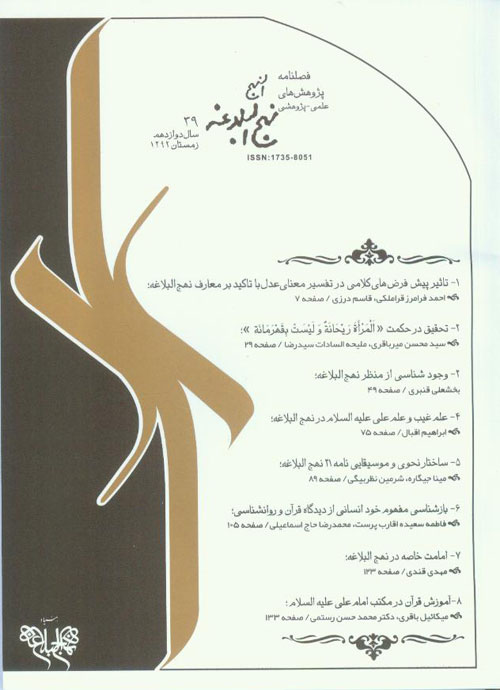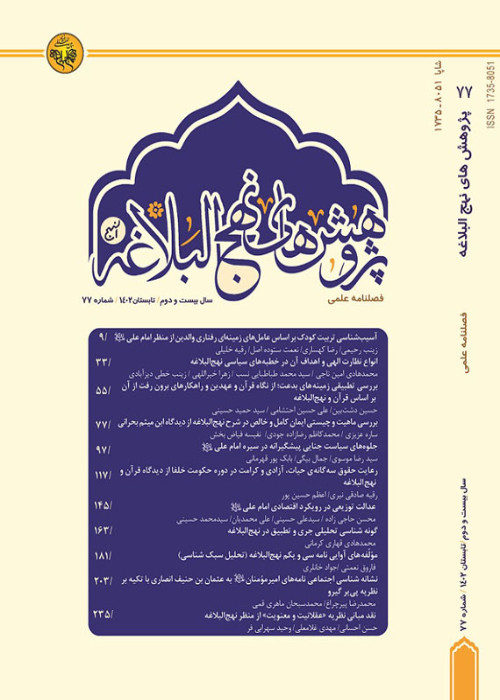فهرست مطالب

نشریه پژوهش های نهج البلاغه
سال دوازدهم شماره 4 (پیاپی 39، زمستان 1392)
- بهای روی جلد: 70,000ريال
- تاریخ انتشار: 1392/11/15
- تعداد عناوین: 9
-
-
صفحه 5
-
صفحه 49
-
صفحه 123
-
صفحه 133
-
Page 7Both Shi’a and the Mu’tazilah to believe in the inherent good and evil deeds, are called Adliya (devotees of Divine Justice); but there are fundamental differences between the two sects, which make them to have different perception of meaning Divine Justice. The most important distinction between the Shi’a and the Mu’tazilah in regard to issue of Divine Justice is debate on monotheistic actions. Mu’tazilah deny the monotheistic actions. They regard it incompatible with the absolute freedom of man in their actions in the world. So, accepting of “opposites makes known each other”, they regard Divine Justice as denial of absolute freedom of man. In other words, presupposition of absolute freedom of man causes denial of Divine Justice. In contrast, by denying absolute freedom of man and believing in “Al- amr bein al-amrein’, Shiite accept monotheistic actions of man and also regard such a thing as Divine Justice. The Shia also with this presumption explain the meaning of Divine Justice. Certainly the best resource for Shia in this case is Nahj al-Balagha, which present such distinct sense of justice for investigators.Keywords: Ali (AS), Nahj al Balagha, Divine Justice, absolute freedom of man, Divine providence, Shia, the Mutazilah
-
Page 29One of the ahadith (traditions) that refers to woman’s high position at Imam Ali’s viewpoint is “Inna al- mara’ta rayhanat va laysat beqahramanat (certainly the woman is like a flower and she is not a hero)”. This noble Hadith is in Nahj al-balagha, 31th letter, quoted letter. Imam Ali’s view about the woman has been expressed with perfect clarity in this tradition. It can explain other sayings of Imam Ali about women in other parts of Nahj al-balagha. In this paper, by referring to the quotes and expositions of this hadith, its meaning and logic is studied and woman’s high position at Imam Ali’s viewpoint is explained.Keywords: woman's position, Nahj al balagha, Imam Ali, Hadith, qahramanat
-
Page 49This paper studies the notion of ontos, to the extent that is existence, in Nahj al-balagha. This research shows that the “simple and absolute being” has not been discussed in Nahj al-balagha independently and without regard to its instances, but considering instances, particularly God, has been considered. Of course it is clear that the being in this meaning has been discussed little in religious sources, but in some parts of Nahj al-balagha it is seen, however seldom. There are numerous instances of being in this book, while the multiplicity of it is real, not subjective. God is the origin of creatures and creator of them. By presenting theories of monotheism, this paper has achieved in this result that Nahj al-balagha does not acknowledge pantheism, although there are some passages and phrases that refer to it. In some cases, there is witnesses to unity of intuition. the result is that this book knows being equal with God.Keywords: Nahj al balagha, monotheism, pantheism, unity of intuition, multiplicity of being, being
-
Page 75Imam’s foreknowledge and knowledge is important and sensitive issues of religious faith and knowledge. Hazrat Ali (AS), according to the Quran, introduces and explains God’s foreknowledge in Nahj al-balagha. He also introduces and explains his knowledge that includes widespread sciences except foreknowledge, dedicated only to God. According to the words of the Imam, the source of his vast knowledge is the Messenger of Allah (PBUH), who received those Sciences through divine revelation and transferred them to Imam Ali (AS) through education (teaching) and inspiration. Imam’s knowledge of the upcoming events and inkling to some of them are included among them. Contemporary audiences of Hazrat Ali (AS) are usual heirs of Imam’s knowledge and next Imams are certain heirs of his knowledge.Keywords: foreknowledge, Imam's knowledge, Holy Quran, Nahj al balagha, heirs of Imam
-
Page 89From the viewpoint of constructivism in language, in some way, all elements and parts of speech are in relation with other elements and parts. Linguistic signs make a consistent and coordinate set that its principal elements, based on certain principles, are interdependently connected and joined together. This research with constructive approach and analytical technique, attempts to study the role of syntactic and musical structure of the 31th letter of Nahj al-balagha and achieve in a profound perception and structural recognition about it.Keywords: 31th letter of Nahj al balagha, constructivism, syntactic structure, musical structure
-
Page 105A set of beliefs that the person has about himself is called self- concept. In other words, as a result of self- concept, everybody produces his own belief about himself. According to psychological research, this self- concept refers to possible “selves” in everybody’s personality that can create necessary motivations for actions that can cause different responses in different actions. So the self- concept isn’t an abstract concept, but it reacts and interacts with the environment by observing the outcomes of action and reaction. This dynamic aspect of self-concept is very important since it results in human being this view that “I can change and adjust”. Islamic teachings regard the issue of “self” as “soul”. Mentioning the types and levels of the soul, Holy Quran makes a man familiar with this statement and explains its “good” and “evil” outcomes. This paper studies the concepts of “self”, “self- concept” and “soul”, and its applications in psychological teachings and religion, provides strategies that on the base of them we can reach in an advanced healthy personality.Keywords: soul, self, concept, identity, forgetting oneself, God, Holy Quran
-
Page 123Imamat and leadership of community, as an important and major issue, are often considered in the sermons and letters of Imam Ali (AS). The content of these sermons and letters about leadership can be classified in the “general Imamat “and “special Imamat “. This paper focuses on the first issue, the “special Imamat “. “Special Imamat “in its totality denotes to the individual right of the household of “Prophet” Muhammad (PBUH) for the “leadership of community”. Looking more specifically it focuses on the right of Imam Ali to stand in the place of the Imam after the Holy Prophet. Both of the “general Imamat” and “special Imamat” are emphasized in Nahj al-balagha. In this article, passages of 24th sermons, letters and wisdom has been mentioned on the right of Imam Ali to stand in the place of the Imam after the Holy Prophet.Keywords: Nahj al balagha, Imamat, leadership, general Imamat, special Imamat, Imam Ali (AS)
-
Page 133Holy Quran is the origin of the Divine teachings. It has a great place in religious education. The necessary and full enjoyment of this infinite grace are teaching and learning, reading, understanding, reflection on its verses and to do them. Nahj al-Balagha, while addressing the importance, virtue and reward of teaching of the Quran, emphasises its learning at an early age and, in some cases, highlights it. Result of incomplete teaching of in childhood and adolescence, Although the age of onset of learning the Qur’an has not explicitly been specified in the Quran, but studying of Imam’s sayings, and the real traditions of Holy Prophet (PBUH), emphasize the age of onset of learning the Qur’an, Formally and directly, from 7 to 14 years. In the third seven years, its implementation on the ground must be provided till the Qur’an is infused with young blood and flesh. By exploring the concept of teaching the Quran and its Conditions and accessories in the words of Imam Ali (AS), the complete and successful training requirements of the Quran is explained.Keywords: Holy Quran, Nahj al Balagha, learning the Quran, teaching the Quran, the age of onset of learning the Quran


